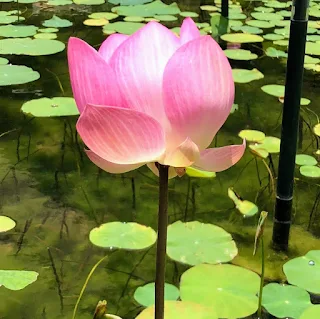Modi was in Kuala Lumpur during this tumultuous time, when the world faced many uncertainties: an uprising in Iran, a yo-yoing tariff threat from the USA, a move to remove the USD as the main trading currency, and more. Modi's visit was considered significant. The lingering question of the provocative preacher Zakir Naik's status in Malaysia was also expected to be addressed. India was also trying to infiltrate ASEAN by offering its expertise, which is increasingly scorned by citizens of developed nations whose economies India has surpassed and left in awe. The former colonisers, however, have not shed their imperialist mindset.
Things only settled down when the national anthems of respective countries came on air, Negaraku and Jana Gana Mana.
With great humility, the Malaysian Prime Minister, Anwar Ibrahim, began his speech by praising India as a longstanding trading partner and a cultural reservoir for the region. What irked the audience, as I heard the hushed sniggering, was when he addressed the audience as 'brothers and sisters'. Was he trying to sound like Swami Vivekananda in his 1893 Chicago speech? The Malaysians among the audience were quite aware of his 'semua anak saya' pre- election rhetoric and how all that changed when it really mattered. Still, he went on a rant about how India and Malaysia are interlinked over the ages through the Bali Yatra. I thought it would be easier to simply affirm the longstanding, unconfirmed rumour that his grandfather was a sacred-thread-wearing Brahmana to show the link, if the rumour is indeed true. Of course, he did not.
Modi turned out to be quite a salesman. Starting his address with greetings to the crowd, he offered salutations in English, Malay, Tamil, Hindi, Punjabi, and other Indian languages to a frenzied audience. Punctuated by applause, he impressed the listeners with his Malay words, his comparison of the Malaysian favourite food, Roti Canai, to the Malabar Pratha of Kerala, and the names of towns in Malaysia rolling off his tongue, like Batu Caves and Bagan Datoh. Using a teleprompter, the listeners were given the illusion that he was speaking off the cuff, looking directly into their eyes.
He highlighted the giant strides India has made over the last ten years, becoming a force that cannot be ignored. Modi called his old buddy, Anwar Ibrahim, who was his friend before his PMship and other Malaysians to use their common heritage to prosper.
Like Father Christmas, Modi announced some goodies. Malaysians of Indian origin, up to six generations, may qualify as Overseas Indian Citizens and receive an unlimited visa and other benefits. He also mentioned the imminent launch of India’s Unified Payments Interface (UPI) in Malaysia. This would be a boon to the trans-Indian Ocean trade, bypassing the SWIFT system and unnecessary Western banking intervention.
Both leaders try to sell their ideas of unity in diversity. Modi highlighted the various cultures and languages that live under the umbrella of India. Anwar echoed the same sentiments, showcasing the potpourri of cultures through the dances. The highlight of the event was the ensemble of 800 over dancers from various Indian traditions to one song. The performance broke the record in Malaysia's Book of Records for the largest gathering of traditional Indian dancers.
Everything seemed like everyone was living in utopia, and love was oozing from every orifice. Among the Indian attendees, many were Muslim, as evidenced by the characteristic skullcaps and Arabic garb they wore.
Unity in diversity was the buzzword. Each party seems to be patting itself on the back for promoting unity and embracing diversity. Surprisingly, people living under their leadership tend to disagree. In India, many accuse Modi of prioritising the welfare of a particular community. At home, Malaysians are accusing Anwar of the same, practising 'divide-and-rule'. Just 15km from the venue, a group of protesters was assembling to express their discontent toward another community. In the morning, before the function, another group gathered to make it clear to Modi that he is not welcome in Malaysia. We live in a bizarre world. Everyone has their own point of view and is hellbent on proving it right. Who is to say he is wrong?







.jpg)














